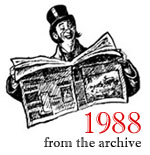
Space, Time, God & Dr. Hawking
IS GOD BUT A DISPOSABLE HYPOTHESIS FOR SCIENTISTS?
Richard Feynman was one of the great theoretical physicists of our age. In his hilarious but deeply disturbing autobiography, Surely You’re Joking, Mr. Feynman, released in 1986, he mercilessly beats about the head and shoulders an unnamed Jesuit priest who, at a meeting Feynman attended, solemnly bemoaned the fragmentation of human knowledge.
Such language Feynman found ridiculous. He then goes on to describe in excruciating detail the techniques for seducing women one can pick up in a bar. Finally, in a passage that may have revealed why Feynman did not stay at Cornell, though he began his teaching career there, he states that the same approach worked on coeds at that university. (Feynman himself explained his move to the California Institute of Technology as due to the circumstance that it simply snowed too much in Ithaca.)
Feynman’s moral obtuseness may not be an example of the fragmentation of knowledge. It may just show a lack of integration of the total person. Another great physicist, however, has raised the question with sharper rigor and explicitness.
The fragmentation of knowledge disturbs Stephen W. Hawking in his magisterial popular work A Brief History of Time. Hawking is at Cambridge University as Lucasian Professor of Mathematics, the same chair Sir Isaac Newton held. As a graduate student he was given the crushing news that he had ALS, amyotrophic lateral sclerosis, better known as Lou Gehrig’s disease. He is now confined to a wheelchair and speaks through a computer.
You May Also Enjoy
Review of The Trademark of God by George L. Murphy, Philosophy of Science by Del Ratzsch, and Cross-currents by Colin A. Russell
Thomism is an integral part of the millennial flow of Western thought and cannot simply be consigned to the dustbin of misguided and superseded systems of philosophy.
Scientific materialism has become the foundation for much of American politics and culture; hence the efforts to turn February 12 into "Darwin Day" in schools.

